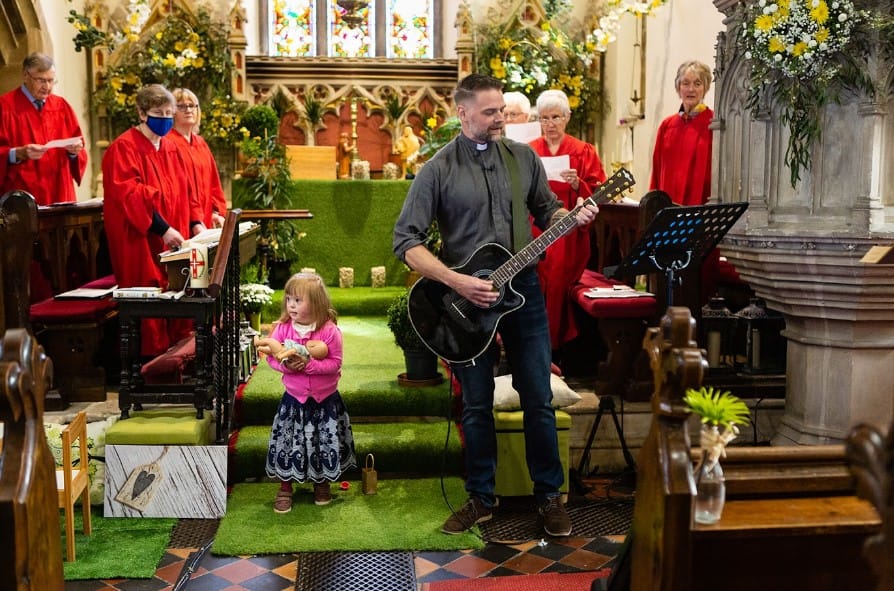Faith

Why Come to Church?
The first question anyone should ask when they are thinking of coming to church is why? Why are you thinking about this? This is not a question that you need to answer before you come, but it is worth some thought because life runs better when you get things in the right order. It is important to know that whatever you may think, God loves you completely and absolutely with an overwhelming river of love that is greater than any faults or failures that you may have. This love is yours already without you ever setting foot in a church.
However, if you want to spend time with others who are getting to know this love, if you need a moment away from the stories of the world to focus on love again, or if you just need to sing, dance and relax, then church is a good place to be.
This is a fundamental message in our church - You cannot earn God’s love, but you can spend your whole life learning about His love for you. The Bible can help you with this, church can help you with this, music and study and prayer can help you with this. But the best way to learn about God’s love for you is to try loving other people.

What is Our Approach to Church?
We are building a community that is working towards a church where everyone has equal opportunity to experience God, reach their potential and spread God's Love, regardless of ability, age, race, gender or ethnicity. Our aim is to create tangible change in how we understand, deliver and share the Love of God. We want to provide our whole church family and our environment with tools to receive and share God's Love.
I am sure that in our experiences with children, they have surprised us with their insight, depth of response or perception of a spiritual matter.
Spirituality is described as ‘an awareness that there is something other, something greater than the course of everyday events’ (Elaine McCreery). It is thus experiential and holistic. It is also at the foundation of our Christian faith.
In Genesis 1:26–27 it is noted that God created humans to be like himself. Therefore, made in the image of a loving, generous and forgiving creator God, we likewise have the capacity for love, generosity, forgiveness and creativity. Ephesians 2:10 reinforces that we are ‘God’s handiwork’ and Psalm 139:13–16 represents a meditation on God’s purpose and design of human life. These examples illustrate how the central element of human nature is the innate ability to relate to God who made us as spiritual beings in the way that he himself is spiritual.
Theological Thinking
This is a short call to think theologically.
Theology just means thinking about God.
When we speak, act, or do anything else in this world as Christians it affects our relationship with God. Not in the sense that He likes us more or less, but more like whether we are facing towards God or away from Him.
Looking at what Jesus has asked us to do, to ‘make disciples of all nations’, everything we do affects this mission. When people see us, are we pointing towards Him or away from Him?
Now I don't want to discuss the whole world here, but just to think about what happens in church on Sundays.
People come to church, knowing it or not, to encounter Jesus or to present Jesus, or hopefully both.
As vicars, the focus of this may sometimes fall on us. But actually all of us, the whole body, the whole church family, play a part in presenting Jesus.
The Bath and Wells strapline, 'Living the story and telling the story' is very useful here, particularly the focus on 'story' - as the fact is that we are a storied people. The only risk is that you might see living the story and telling it as two separate things.
But when you think theologically - when you think towards God - and let this inform everything else you do - you actually tell the story by living it.
So this is a call for everyone to start thinking theologically in general.
But there is a particular idea that I want to introduce that I think can help us to think theologically about what we do on Sundays.
We are used to the idea that God saves us, and even that he saves us by dying for us. But how does this actually save us?
Three key ideas:
1. Words are slippery
Each word you have is accompanied by a mental model that back fills this word to give it meaning. For example, when we say the word ‘dog’ it will conjure up certain basic concepts, a creature with four legs, hairy, barks, has a tail, or teeth? But this model will then be further coloured, by your information and experience. Or, what about something more serious, like mother, or father? We won't travel too far down this road, but we need to understand that, in the same way, our understanding is coloured, enriched, and enlightened, by all of the events and information that we have gathered throughout our lives.
2. We are a storied people
Each ‘truth’ is back filled, or coloured by stories that enrich their meaning. A story that tries to describe the world in a way that can make it understandable, and maybe do even more than that. We, as Christians, are not about ‘random’ acts of kindness, we are a storied people. There is a story that describes the arc of history and God's plan for saving us. This is the story of the universe, but also, inevitably, if you choose to acknowledge it, it's the story of your lives.
3. Jesus is not a book
We are not really ‘people of the book’. We have a book, inspired by God, but God did not come as a book, he came as a life lived, and died for us. This is why ‘the word of God’ is a slippery term, because, what is in a name? Would a God by any other name still smell as sweet? Don’t get too hung up on words, it’s the descriptions, the stories about God, that really matter. Getting to know Jesus is what puts the story of the Bible into its proper focus.
Because words are slippery, any metaphor will break down under too much pressure. But still, a useful idea for helping to organize your thoughts around salvation is Paul's use of ‘adoption’.
That what God does for us, at great cost to himself, is that he adopts us into this family. Not because of anything we have done, just because he loves us and wants to bring us home.
With this adoption comes a whole load of stuff, new identity, new inheritance, new family... but alongside all this there is, inevitably, trauma...
The adoption is done, it is finished, but the cost of the trauma? Who takes that burden? If we think theologically, it is the family, specifically the body of Christ, that bears the burden, the pain and suffering of bringing us in as God's children.

And who now is the body of Christ?
We are, the church. And who are these children we are bringing in? They are the people who come in through the doors of the church. God's adopted children, sometimes literal children, sometimes metaphorical, but all needing love, acceptance and patience.
So what do we do? For each other? For those who are coming in? What does discipleship look like through this idea of adopted children?
The aim of the family is to minimise the trauma for those they are adopting in. In the world this may mean cooking frozen potato shapes, it may mean changing washing powder to bring familiar smells, it may mean filling your cupboard with 50 boxes of Weetabix just to show that we will never go hungry.
In the context of Sunday worship this may mean letting go of some of our precious values relating to conduct and propriety - the comic cultural example being offering Red Bull or Relentless at the end of the service rather than coffee - it would in no way affect the liturgy, but it seems antithetical to the 'normal church culture'. But what would you be willing to lay down in order to show love?
Discipleship in this context would not be the church disciplining new members into correct behavior, but the discipline of a family maintaining love, compassion and empathy when these are challenged and stretched by new 'unchurched' people coming in.
We must be pointing to Jesus through our actions and relationships, living and telling the story, for 'everyone will know that you are my disciples, if you love one another'
Further Links





